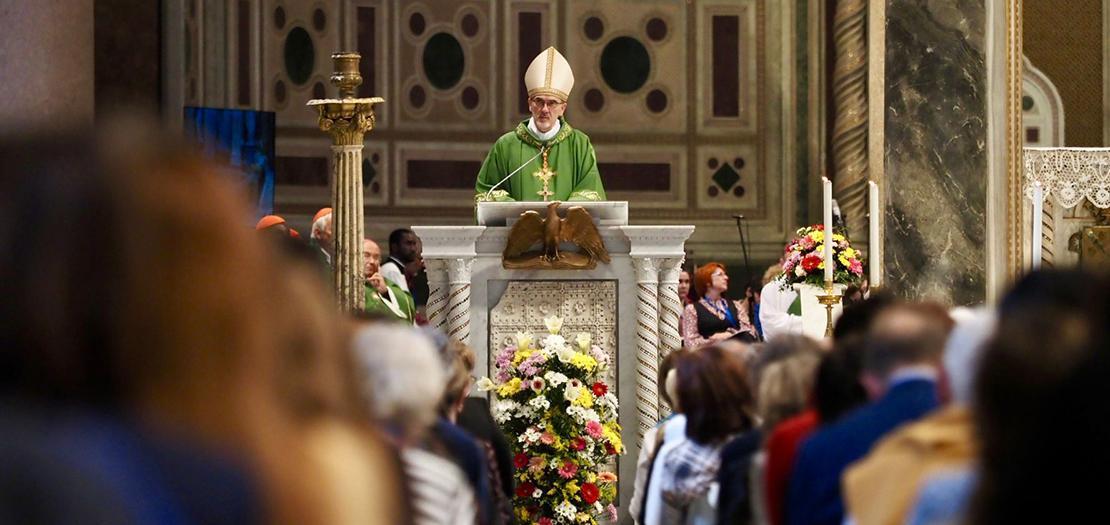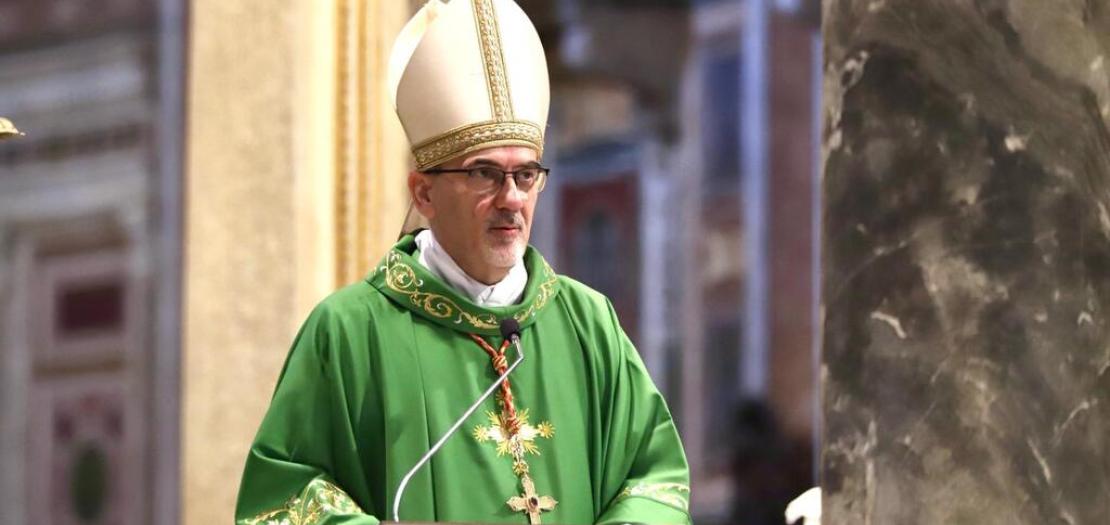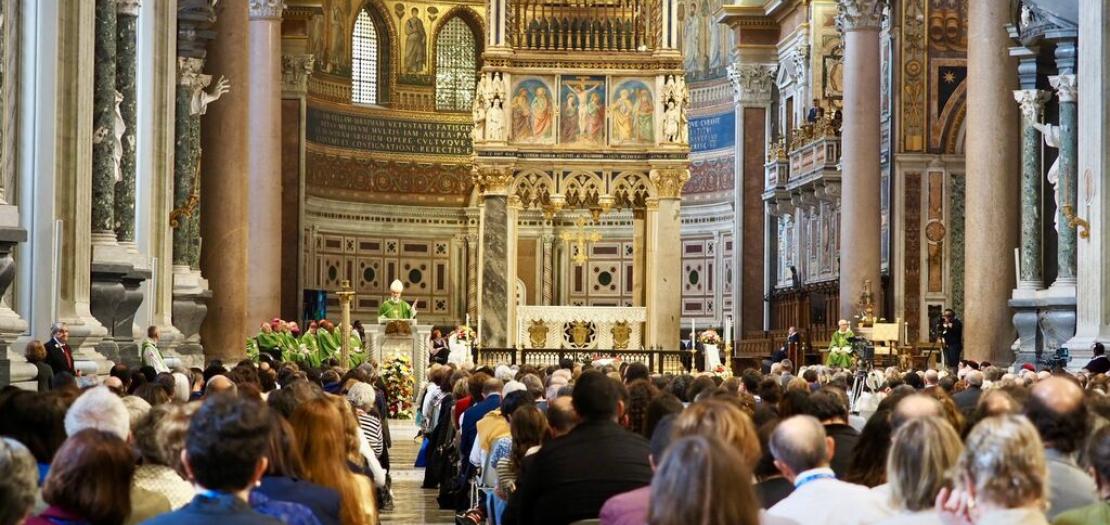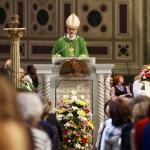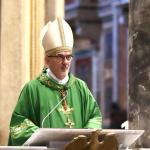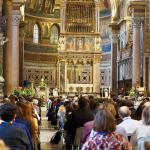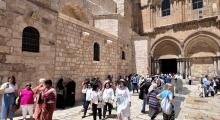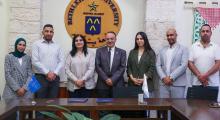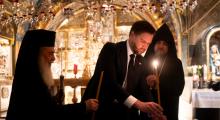Issued by the Catholic Center for Studies and Media - Jordan. Editor-in-chief Fr. Rif'at Bader - موقع أبونا abouna.org
The International Meeting “Dare Peace” opened in the Basilica of St. John Lateran with the Eucharistic Liturgy presided over by Cardinal Pierbattista Pizzaballa, Patriarch of Jerusalem of the Latins.
The cardinal invited everyone to look sincerely into their hearts and not to give in to the logic of force: “The idea that force is necessary to build peace dominates... yet we have seen the material, human, and spiritual ruins that this produces.” He recalled that “only reconciled hearts can reconcile, only pacified hearts can dare peace.”
In his greeting, Marco Impagliazzo thanked the Patriarch for his presence and his testimony “in a difficult time for the Holy Land and for the whole world” because “daring peace means imagining a future of a world at peace.”
Cardinal Pizzaballa's homily
The Gospel we have heard today speaks to us of God, and of how to be and live in His presence. It speaks to us of justice. Or rather, it teaches us that it is God who justifies, who does justice. And He does so by forgiving, because only His forgiveness can make us worthy to stand before Him, thus reestablishing the covenant between men. The Word leads us into the heart of the temple, where the destiny of man before God is decided. And it asks us: what justice do we seek? What peace do we desire?
So we are in the temple, where two men go up to pray. Two men, two prayers, two hearts. One presents himself with the pride of one who considers himself righteous; the other with the humility of one who recognizes himself as a sinner.
The Pharisee, while observing the Law, does not enter into a relationship with God. He raises his eyes, but he does not look at God: he sees only himself. He talks about himself, compares himself with others, judges. He is not described as a hypocrite: he is sincerely religious, and even does more than the Law requires. Precisely for this reason, he feels at peace, with a clear conscience, and considers himself better than others.
The tax collector, on the other hand, trusts. He keeps his eyes downcast, but unlike the Pharisee, he is looked upon by God. He acknowledges his sin without justifying himself, without defending his conduct. He does not minimize his mistakes, but presents himself before God as he is, without masks. He does not seek excuses, he does not compare himself to others, he does not absolve himself. He simply says, “O God, have mercy on me, a sinner,” and thus he stands before God in truth. The truth of one who recognizes that only God is righteous, and that in His righteousness He welcomes every man, even the sinner. In God, mercy and justice are inseparable: to do justice means to forgive.
The tax collector knows he is a sinner, but he does not fear that his sin is an obstacle to encountering the Lord, something to hide or justify. He has nothing to offer but his own misery. And it is precisely there, in that nakedness of the soul, that God encounters him and justifies him.
The Pharisee's attitude is more widespread than it seems. It is the attitude of those who trust in strength, in moral superiority, in the presumption of being right. Of those who, as a result, arrogate to themselves the right to judge others and interpret them as they please: “I thank you that I am not like other men, thieves, unjust, adulterers, or even like this tax collector” (Lk 18:11). This attitude can lurk not only in people's hearts, but also in many institutions, including our own. Instead of building relationships with God and forging just bonds with others, this attitude raises barriers, generates misunderstanding, and foments violence. How much suffering can be caused in the name of one's own idea of justice, imposed outside of a context of respect and listening!
I am thinking, at this moment, of our Holy Land. A deep and lacerating hatred has invaded us, creating divisions between peoples and within peoples themselves. Legitimately different opinions are transformed into harsh judgments that deeply wound relationships. Like the Pharisee, many today set themselves up as judges, convinced that they are right. But the Gospel reminds us that it is not the force of our judgment that justifies us, but the truth of our hearts before God.
The idea prevails that force is a necessary condition for building peace, that only with weapons can a just solution to conflicts be imposed, that in order to do justice it is necessary to annihilate the adversary. Yet we have seen what material, human, and spiritual devastation all this has produced. Our time seems marked by conflicts, by open wounds, by peoples who view each other with suspicion or fear. Everyone is convinced that they are right, that what they have done and continue to do is legitimate, even necessary. It is a vicious circle that is difficult to break.
Of course, there is also a lot of pain. Authentic suffering, which deserves respect and attention, and which no one has the right to minimize.
But this is not the time for political or sociological analysis. We are here to ask ourselves what today's Gospel suggests for our reflection on this day dedicated to the courage to dare peace.
Jesus shows us a different way of standing before God and before man. A way that does not come from strength or moral superiority, but from the truth of the heart. Only those who recognize their fragility and need for mercy can become instruments of reconciliation.
Peace is based on faith and conversion to God. On standing before Him in the right way, like the tax collector, not like the Pharisee. When we recognize that without God we can do nothing. If, on the other hand, we build human coexistence solely on exclusively human models, on the idea of power and superiority, then we are building on sand. A building that will eventually collapse. When man becomes his own master, he ends up ruining himself. When institutions, instead of serving their communities, feel superior and self-sufficient, they bring about ruin.
Peace is not built with declarations, but with hearts that allow themselves to be touched by God and by others. Hearts open to the desire for truth, capable of dialogue, even dialectical. Recognizing our weakness allows God to act in us. When we recognize our need for mercy, we also allow others to show us mercy. And mercy is the foundation of all justice, on which a solid and true peace can be built.
Peace is not just a social convention, an armistice, a truce, or the absence of war, the result of diplomatic efforts or geopolitical balances, however necessary. Peace is recognizing the truth and dignity of every human being; it is knowing how to see the face of God in others. When the face of the other dissolves, the face of God also vanishes, and with it the possibility of authentic peace. No one is an island: to destroy the face of the other means to dissolve one's own.
To build peace, it is necessary to know how to see the other, but also to ask oneself how one looks at them, especially when it comes to the poor and the oppressed. This is the mission of the Church: to bring to the world's attention the lives of those whom many would prefer not to see or meet, but who exist, are real, and await our response.
Peace is the fruit of justice, truth, and mercy. It is the face of God reflected in our faces when we allow ourselves to be reconciled with Him and with one another.
Mercy, justice, truth, peace: words that are central to life in the world, but which may seem far removed from the concrete experience of so many peoples. Demanding words, which in the Holy Land – where I come from – sometimes even cause annoyance. Because they appear to be slogans, empty words, distant from the reality of those crushed by age-old conflicts.
Yet the witness of courageous people – today's publicans – even in the drama of our time, has restored concreteness and truth to these words. It is the witness of those who know how to beat their breast (Lk 18:13), to recognize themselves as in need of mercy, and therefore capable of offering it; to bend over the wounds of others; to see the face of God in others.
Young people who, on October 7, lost most of their families and now devote their time to helping other families devastated by that day. Others who, under the bombs, offer protection. Hungry families who share what little they have with those who have lost everything. Young people who risk their lives to help the wounded and the sick. Mothers who come together to care for children left alone. Teachers without schools who do not give up looking for their students to continue teaching them. And many others.
We need these witnesses. We need those who humbly place themselves at the service of God and humanity, even in the midst of the human devastation we have seen in recent months. We have met many such people. They have been, and continue to be, indispensable instruments of consolation and hope for so many. They will be the ones to rebuild new models of coexistence from the rubble of this time.
All is not lost. There are still righteous people capable of doing divine justice, of bringing forgiveness and consolation, of recognizing each other as brothers and sisters, beloved children, and of putting themselves on the line to preserve the image of God in the world. As long as they are there, it will still be possible to give substance to words such as justice, forgiveness, truth, and peace. And to still believe they are possible, even in the Holy Land.
Today, let us ask the Lord to give us a new heart. A heart that knows how to weep for the pain of the world, that does not close itself in fear, but opens itself to trust. A heart that, like that of the tax collector, knows how to say: “O God, have mercy on me, a sinner”, and start again from there.
We thank the Community of Sant'Egidio for its tireless commitment to building bridges of peace where the world raises walls.
Only reconciled hearts can reconcile. Only justified hearts can justify. Only pacified hearts can dare to make peace.


